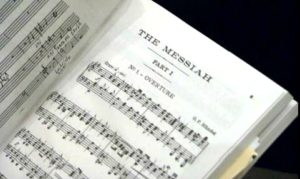© 2017 Neal Waldrop
© 2017 International Urantia Association (IUA)
| The Temple of Spiritual Brotherhood and the Greater Meaning of Study Groups | Journal — May 2017 — Index |

In recent years, Internet websites have displayed at least five semi-viral videos showing members of a choir and orchestra who had surreptitiously infiltrated the central court of a large department store or shopping mall, and then—to the surprise and delight of the assembled shoppers, who had merely migrated to their favorite site for shopping so as to purchase gizmos or doodads or what-ever else may have caught their fancy—suddenly arose from their seats and emitted the thunderous lyrics and chords of the Hallelujah chorus from the celebrated oratorio The Messiah by George Frideric Handel. [1]
Although opinion polls seldom examine such topics, it is quite possible that the Hallelujah chorus is the most beloved choral work ever to emerge from the realm of classical music and acquire great popular renown, at least in locations where English is spoken. The words read as follows:

Hallelujah!
for the Lord God omnipotent reigneth,
The kingdom of this world is become
the kingdom of our Lord and of His Christ;
and he shall reign for ever and ever,
King of Kings, and Lord of Lords.
In The Urantia Book’s Paper 21 entitled, “The Paradise Sons of God,” a Perfector of Wisdom duplicates the phrase ‘King of Kings and Lord of Lords.’ On the other hand, this seems substantially more likely to be an implicit reference to the corresponding verse in the Christian scriptures (i.e., Revelation 19:16), rather than a citation from the Hallelujah chorus_._ Nonetheless, we should bear in mind that the implicitly political overtones of the phrase “the kingdom of God” gave the early Christians considerable trouble, as the Midwayer Commission points out in Paper 170:
By the time the Apostle John began to write the story of Jesus’ life and teachings, the early Christians had experienced so much trouble with the kingdom-of-God idea as a breeder of persecution that they had largely abandoned the use of the term. John talks much about the “eternal life.” Jesus often spoke of it as the “kingdom of life.”
He also frequently referred to “the kingdom of God within you.” He once spoke of such an experience as “family fellowship with God the Father.” Jesus sought to substitute many terms for the kingdom but always without success. Among others, he used: the family of God, the Father’s will, the friends of God, the fellowship of believers, the brotherhood of man, the Father’s fold, the children of God, the fellowship of the faithful, the Father’s service, and the liberated sons of God. [UB 170:2.24]
When Handel composed his oratorio, the word king was by no means bereft of political meaning, and the word lord, although considerably less imposing than it had been a few centuries earlier, still retained substantial overtones associated with social hierarchy and the ruling class. This may be easier to understand if we illustrate the point by citing the title of a literary work that was widely read during the second half of the 20th century and that, when converted into cinematic fantasy, acquired extraordinary popularity during the initial years of the 21st: The Lord of the Rings. Having said all the above, it is only reasonable to stipulate that the Hallelujah chorus of Handel’s oratorio The Messiah remains stirring and moving, at least for persons with cultural backgrounds that are predominantly Christian. In the final analysis, this majestic choral work of the mid-18th century has clearly earned its popularity and renown among persons who speak English.

Now, however, we are obliged to bid a reluctant adieu to the various shopping malls where choirs and orchestras suddenly burst forth with their favorite chorus, so that we can migrate to a concert hall where we may have the opportunity to hear the air, “I know that my redeemer liveth.” This is the succeeding segment of Handel’s oratorio, featuring a single soprano standing in splendid isolation, preferably a coloratura soprano who will be able to engage in a series of runs, trills, and other vocal exploits demonstrating extraordinary talent and great virtuosity. In this discussion, however, we do not have those advantages; we cannot rely on rhythm, melody, or lyrical expression. To the contrary, we must confine ourselves to examining the words that the soprano sings:
I know that my redeemer liveth,
and that He shall stand
at the latter day upon the earth:
and though worms destroy this body,
yet in my flesh shall I see God.
For now is Christ risen from the dead,
the first fruits of them that sleep.
Here we are immediately in trouble, for Christ Michael of Nebadon, incarnate in the human form of Jesus of Nazareth, was definitely not a “redeemer.” Further, calling him “my redeemer” creates overtones of exclusiveness and possessiveness that are unappealing and unpleasant, to say the least.
When we continue to examine the text, we realize that the word “liveth” is either highly misleading or simply false, for the phrase “Jesus of Nazareth” now identifies an integral and inseparable part of the completed spiritual identity of our Sovereign Creator Son, Christ Michael of Nebadon, not a separate individual who is currently active and alive in the spiritual realm. Despite Michael’s promise to return to Urantia, it is not accurate to state that, “He shall stand at the latter day upon the earth” (a reference to the events that Christians call “the Last Judgment”).
The phrase, “in my flesh shall I see God” also involves a serious misunderstanding; one that seems to stem from a fundamental mistake in interpreting a spiritual reality, the resurrection of Jesus:
The Christian belief in the resurrection of Jesus has been based on the fact of the “empty tomb.” It was indeed a fact that the tomb was empty, but this is not the truth of the resurrection. The tomb was truly empty when the first believers arrived, and this fact, associated with that of the undoubted resurrection of the Master, led to the formulation of a belief which was not true: the teaching that the material and mortal body of Jesus was raised from the grave. Truth having to do with spiritual realities and eternal values cannot always be built up by a combination of apparent facts. Although individual facts may be materially true, it does not follow that the association of a group of facts must necessarily lead to truthful spiritual conclusions.
The tomb of Joseph was empty, not because the body of Jesus had been rehabilitated or resurrected, but because the celestial hosts had been granted their request to afford it a special and unique dissolution, a return of the “dust to dust,” without the intervention of the delays of time and without the operation of the ordinary and visible processes of mortal decay and material corruption.
The mortal remains of Jesus underwent the same natural process of elemental disintegration as characterizes all human bodies on earth except that, in point of time, this natural mode of dissolution was greatly accelerated, hastened to that point where it became well-nigh instantaneous.
The true evidences of the resurrection of Michael are spiritual in nature, albeit this teaching is corroborated by the testimony of many mortals of the realm who met, recognized, and communed with the resurrected morontia Master. He became a part of the personal experience of almost one thousand human beings before he finally took leave of Urantia. [UB 189:2.6-9]
Let us now return to the soprano solo’s first line, “I know that my redeemer liveth.” We have already demonstrated that “my redeemer” and “liveth” cannot be justified, which leaves only the first three words, “I know that …” As a practical matter, the words “know that” must likewise be deleted, for it is impossible to know something that is false. Therefore, we must annotate the statement as follows:
I know that my redeemer liveth
In effect, this mark-up also interprets all seven lines of the soprano solo, for we have encountered a perspective that appears to be entirely egotistical. These seven lines focus overwhelmingly on proclaiming and celebrating the purportedly privileged status of an individual believer; they offer no hint of a desire to serve other human beings or to participate in joint efforts aimed at helping to improve and upgrade society. Therefore, in my view, we are implicitly confronting selfishness that is intrinsic and intense. Further, this selfishness turns out to be the true Hallelujah aftermath. I regret that this is so, and I also regret that I am obliged to bring these unpleasant realities to your attention.
On the other hand, we must not neglect other crucial implications of these seven lines sung by a virtuoso soprano. The purpose of this part of our discussion is not just to indulge in rather acid observations keyed to an intriguing cultural artifact that we have inherited from the 18th century, but also, by implication, to focus on the intense anxieties about salvation (survival) that institutional Christianity almost invariably stimulates and fosters.
These fears are endemic and pervasive, for we may trace them from Paul to Augustine, from Augustine to Luther and Calvin, and then from their era, now almost five centuries ago, right onward into our own. The underlying truth is that many traditional believers living in the new millennium remain preoccupied, entangled, and perhaps even intensely afraid because of the characteristic teachings of Christianity about hell and damnation. In effect, these fears amount to the unfortunate psychological debilities that inspired Charles Jennens, Handel’s scribe, to identify and compile these verses, that led George Frideric Handel to compose the score that enables a soprano to sing them, and that have evoked virtuoso performances of this solo air in every generation ever since.
To be sure, it is entirely appropriate for us to sympathize with every human being mentioned in the preceding paragraph, whether directly or indirectly, but the far more important point is that the revelators have bequeathed to us a vastly more encouraging account of the transition leading to the ascendant life:
Eternal survival of personality is wholly dependent on the choosing of the mortal mind, whose decisions determine the survival potential of the immortal soul. When the mind believes God and the soul knows God, and when, with the fostering Adjuster, they all desire God, then is survival assured. Limitations of intellect, curtailment of education, deprivation of culture, impoverishment of social status, even inferiority of the human standards of morality resulting from the unfortunate lack of educational, cultural, and social advantages, cannot invalidate the presence of the divine spirit in such unfortunate and humanly handicapped but believing individuals. The indwelling of the Mystery Monitor constitutes the inception and insures the possibility of the potential of growth and survival of the immortal soul. [UB 5:5.13]
The Thought Adjuster will recall and rehearse for you only those memories and experiences which are a part of, and essential to, your universe career. If the Adjuster has been a partner in the evolution of aught in the human mind, then will these worth-while experiences survive in the eternal consciousness of the Adjuster. But much of your past life and its memories, having neither spiritual meaning nor morontia value, will perish with the material brain; much of material experience will pass away as onetime scaffolding which, having bridged you over to the morontia level, no longer serves a purpose in the universe. But personality and the relationships between personalities are never scaffolding; mortal memory of personality relationships has cosmic value and will persist. On the mansion worlds you will know and be known, and more, you will remember, and be remembered by, your onetime associates in the short but intriguing life on Urantia. [UB 112:5.22]

Rather than focus on positive and inspiring teachings resembling those that the revelators have shared with us, the early Christians appear to have maintained and developed ideas about potential punishment in the afterlife that they inherited from the Jewish tradition. The Midwayer Commission tells us that when Peter recounted a story of the Nazarite brotherhood that John the Baptist had repeated while preaching in public—a parable concerning a rich man named Dives and a beggar named Lazarus—Peter initiated his narrative by declaring, “this olden parable is not according to the gospel we preach.”
Peter’s disclaimer, however, does not appear in the New Testament (Luke 16:19-31). To the contrary, the immediately preceding verses in chapter 16 of the Gospel according to Luke consist of statements by Jesus. Therefore, the context implies that Jesus told the story about Dives and Lazarus and that he agreed with the ideas it contains, including the assertion that Dives was being tormented in hell. As a result, this reference to potential punishment in the afterlife was ascribed to Jesus and became an integral part of Christian teachings. In contrast, the Midwayer Commission comments as follows in Paper 188, which is entitled, “The Time in the Tomb”:
All this concept of atonement and sacrificial salvation is rooted and grounded in selfishness. Jesus taught that service to one’s fellows is the highest concept of the brotherhood of spirit believers. Salvation should be taken for granted by those who believe in the fatherhood of God. The believer’s chief concern should not be the selfish desire for personal salvation but rather the unselfish urge to love and, therefore, serve one’s fellows even as Jesus loved and served mortal men. Neither do genuine believers trouble themselves so much about the future punishment of sin. The real believer is only concerned about present separation from God. True, wise fathers may chasten their sons, but they do all this in love and for corrective purposes. They do not punish in anger, neither do they chastise in retribution. [UB 188:4.9-10]
By implication, the passage cited immediately above confirms and reinforces our prior analysis of the soprano solo, “I know that my redeemer liveth.” Let us return, however, to the parable about Dives and Lazarus, the story that Peter told while quoting John the Baptist. Since the Midwayer Commission states that Jesus was frequently asked to comment on this parable but never consented, it is natural for us to wonder why he declined. Perhaps we shall have a better insight into Jesus’ motivations for remaining silent if we review his reply to a question that the apostle Simon asked under entirely different circumstances, when Jesus and the apostles had just begun their public work and were teaching in Amathus. Simon, it seems, had been seeking to interest a Persian named Teherma, but had made little progress.
When Simon Zelotes and Jesus were alone, Simon asked the Master: “Why is it that I could not persuade him? Why did he so resist me and so readily lend an ear to you?” Jesus answered: “Simon, Simon, how many times have I instructed you to refrain from all efforts to take something out of the hearts of those who seek salvation? How often have I told you to labor only to put something into these hungry souls? Lead men into the kingdom, and the great and living truths of the kingdom will presently drive out all serious error.” [UB 141:6.2] (Emphasis added)
In effect, the spirit of this reply to Simon closely resembled the methods that Jesus had drawn on during his discussions with religious teachers whom he met in Rome many years before launching his public ministry in Palestine:
Jesus learned much about men while in Rome, but the most valuable of all the manifold experiences of his six months’ sojourn in that city was his contact with, and influence upon, the religious leaders of the empire’s capital. … And this was his method of instruction: Never once did he attack their errors or even mention the flaws in their teachings. In each case he would select the truth in what they taught and then proceed so to embellish and illuminate this truth in their minds that in a very short time this enhancement of the truth effectively crowded out the associated error; and thus were these Jesus-taught men and women prepared for the subsequent recognition of additional and similar truths in the teachings of the early Christian missionaries. It was this early acceptance of the teachings of the gospel preachers which gave that powerful impetus to the rapid spread of Christianity in Rome and from there throughout the empire. [UB 132:0.4] (Emphasis added)
Now that the revelators have enormously enhanced the truth available to humanity concerning the plan of mortal repersonalization that the governments of Orvonton and Nebadon sponsor and implement, we can hope that this truth will crowd out the accumulated apprehension and fear that Christianity has stimulated and fostered for almost two thousand years, The resulting personal terror was intensified and exacerbated by such cultural landmarks as Dante’s Inferno (an epic poem consisting of about five thousand lines, one-third of the highly complex cycle The Divine Comedy that Dante completed in 1321) and the intensely terrifying Renaissance-era fresco that Michelangelo spent over six years infusing into the plaster wall of the Sistine Chapel in Rome (1534-1541). The fresco depicted, to the best of his ability, imagination, and understanding, the essential aspects of Christianity’s appalling teachings concerning ‘the Last Judgment.’
¶ References
| The Temple of Spiritual Brotherhood and the Greater Meaning of Study Groups | Journal — May 2017 — Index |
Note: This article, “The Hallelujah Aftermath,” is excerpted from “Comparing and contrasting the true teachings of Jesus with the traditional tenets and practices of organized, institutional Christianity,” topic 8 of a book-length document by Neal Waldrop called Revelation Revealed: Twelve Topics to Analyze and Appraise. This innovative text is intended to stimulate and foster active and interactive discussion among readers of The Urantia Book. You can download it in full from www.globalendeavor.net, the modest website of the Committee for the Global Endeavor.
Neal Waldrop

[Editor’s Note: This is an abridged and edited version of Neal Waldrop’s article: “The Hallelujah Aftermath.” The full original and unedited version can also be viewed in PDF format at: Hallelujah Aftermath,Neal Waldrop, complete pdf]
¶ Notes
Composed in 1741, but first performed in 1742. ↩︎